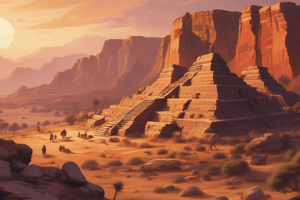Podcast
Questions and Answers
During which centuries did Ancient Greece flourish?
During which centuries did Ancient Greece flourish?
- 3rd and 2nd centuries BCE
- 8th and 4th centuries BCE (correct)
- 2nd and 1st centuries BCE
- 5th and 6th centuries BCE
Which ancient civilization had a significant impact on the establishment of the Roman Empire?
Which ancient civilization had a significant impact on the establishment of the Roman Empire?
- Ancient China
- Ancient Egypt
- Ancient Rome (correct)
- Ancient India
Which ancient civilization is known for producing works like the Iliad and Odyssey?
Which ancient civilization is known for producing works like the Iliad and Odyssey?
- Ancient Egypt
- Ancient India
- Ancient Greece (correct)
- Ancient Rome
Which ancient civilization left behind a legacy of advanced architecture, art, and engineering that continues to fascinate historians?
Which ancient civilization left behind a legacy of advanced architecture, art, and engineering that continues to fascinate historians?
In which century did Ancient Egypt thrive?
In which century did Ancient Egypt thrive?
Which ancient society influenced Judaism, Christianity, and Islam with its Zoroastrian religion?
Which ancient society influenced Judaism, Christianity, and Islam with its Zoroastrian religion?
What was the purpose of the Olive Branch Petition issued during the American Revolutionary War?
What was the purpose of the Olive Branch Petition issued during the American Revolutionary War?
Who led the colonial militias at the Battle of Bunker Hill during the American Revolutionary War?
Who led the colonial militias at the Battle of Bunker Hill during the American Revolutionary War?
Which significant role did George Washington play during the American Revolutionary War?
Which significant role did George Washington play during the American Revolutionary War?
Which military leader was captured along with his brother at Fort Ticonderoga during the American Revolutionary War?
Which military leader was captured along with his brother at Fort Ticonderoga during the American Revolutionary War?
Flashcards are hidden until you start studying
Study Notes
Ancient Civilizations
The study of history encompasses various periods and regions, including ancient civilizations such as Ancient Greece, Rome, Egypt, China, India, Persia, and many more. These societies have left behind rich legacies of art, philosophy, literature, architecture, mathematics, medicine, and technology, which continue to influence our modern world.
Ancient Greece
Ancient Greece, known for its contributions to philosophy, arts, and sciences, was a civilization that flourished between the 8th and 4th centuries BCE. It was during this period that the foundations of Western civilization were laid, as evidenced by the works of philosophers like Socrates, Plato, and Aristotle, and the rich literary tradition that produced works like the Iliad and Odyssey.
Ancient Rome
Ancient Rome was another significant civilization that emerged in the 8th century BCE and was one of the most powerful civilizations in the world until the 5th century CE. It had a lasting impact on the world, including the establishment of the Roman Empire and the spread of Christianity. Rome's government, infrastructure, and military strategies have been studied and emulated by many societies throughout history.
Ancient Egypt
Ancient Egypt, with its advanced civilization that thrived from 3100 to 30 BCE, left behind a legacy of architecture, art, and engineering that continues to fascinate historians and archaeologists. From the iconic pyramids to the elaborate art and religious practices, the Egypt of antiquity is still revered as a cornerstone of human achievement.
Other Notable Ancient Societies
Other notable ancient societies include ancient China, whose Confucian and Taoist philosophies still shape much of Eastern thought; ancient India, with its development of Hinduism, Buddhism, Jainism, and Sikhism; ancient Persia, whose Zoroastrian religion influenced Judaism, Christianity, and Islam; and other Mesopotamian civilizations like the Babylonians, Assyrians, and Phoenicians. Each of these societies had unique cultural, religious, political, economic, intellectual, artistic, and social developments that contributed to the evolution of history.
Olive Branch Petition
During the American Revolutionary War, the Olive Branch Petition was issued by King George III of England in July 1775. This document sought to end hostilities between Britain and her thirteen North American colonies and restore peace through reconciliation. It marked the last attempt by the British monarch to prevent further escalation towards war between the two sides.
Battle of Bunker Hill
In June 1775, during the early stages of the American Revolutionary War, the Battle of Bunker Hill took place near Boston, Massachusetts. This conflict pitted British forces against colonial militias led by Colonel William Prescott and Major General Israel Putnam. Despite being outnumbered and outgunned, the colonial troops put up a valiant fight and inflicted significant losses upon the British. However, the battle ended in a tactical defeat for the colonials due to their eventual retreat.
George Washington
As the first President of the United States, George Washington played a crucial role in shaping America's destiny. His leadership during the Revolutionary War and his presidency helped establish the foundations of the country we know today. As the Commander-in-Chief of the Continental Army, he led the American troops to victory over the British, securing American independence. Later, as president from 1789 to 1797, he oversaw the transition from a confederacy under the Articles of Confederation to the strong central government established by the U.S. Constitution.
Ethan Allen
Ethan Allen was an influential military leader during the American Revolutionary War who fought alongside his brother James, both of whom were captured and held captive at Fort Ticonderoga. Their capture is considered one of the most pivotal events leading to the surrender of British General Burgoyne at Saratoga and ultimately, American Independence.
Studying That Suits You
Use AI to generate personalized quizzes and flashcards to suit your learning preferences.




